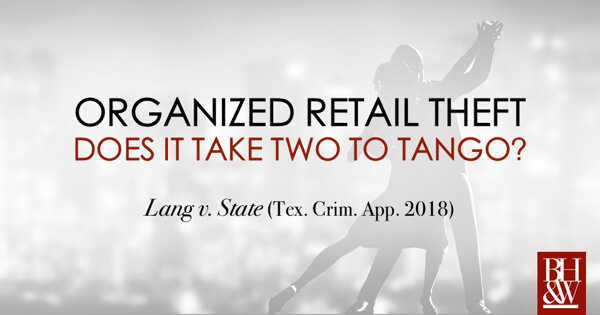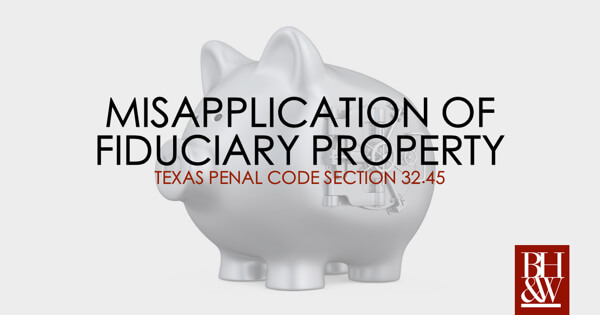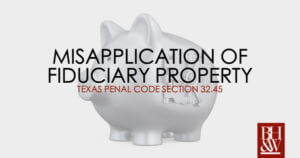

Know your rights: Theft charges in Texas range from petty shoplifting to felony offenses—get the legal defense you deserve.
In Texas, theftis defined underTexas Penal Code § 31.03as the unlawful appropriation of property with intent to deprive the owner of it. But that simple definition masks a wide range of possible charges—from shoplifting a T-shirt to stealing corporate funds. The consequences vary significantly depending on the value of the property, the method of theft, and whether aggravating factorsare involved.
In this guide, we break down the different types of theft charges in Texas, the applicable laws, penalties, and why having an experienced Texas theft defense attorney is critical to protecting your rights.
Types of Theft Charges in Texas
1. Misdemeanor Theft (Sometimes Referred to as “Petty Theft”)
Legal Definition: Theft of property valued at less than $2,500, under Tex. Penal Code § 31.03(e).
Charge Level and Penalties:
- Class C Misdemeanor: Property worth less than $100
• Fine up to $500 - Class B Misdemeanor: $100 to $749 or if the defendant has a prior theft conviction
• Up to 180 days in jailand a $2,000 fine - Class A Misdemeanor: $750 to $2,499
• Up to 1 year in county jailand a $4,000 fine
2. Felony Theft (Including Aggravated Theft)
Legal Definition: Theft becomes a felony when the value of the stolen property exceeds $2,500 or involves certain protected items, like firearms, livestock, or election ballots.
Felony Theft Levels:
- State Jail Felony: $2,500–$29,999
• 180 days to 2 years in state jail, up to $10,000 fine - Third-Degree Felony: $30,000–$149,999
• 2–10 years in prison
Second-Degree Felony: $150,000–$299,999
• 2–20 years in prison - First-Degree Felony: $300,000 or more
• 5–99 years or life imprisonment
Aggravating Circumstances:
- Offense against elderly or nonprofit entities
- Use of deception or breach of fiduciary duty
- Use of a weapon (often charged separately or elevates to robbery)
3. Robbery and Burglary: Theft With Force or Intrusion
Although distinct offenses, robberyand burglaryoften stem from theft-related conduct and are charged under separate statutes:
Robbery – Tex. Penal Code § 29.02
- Involves intentionally or knowingly causing bodily injuryor threateninganother while committing theft.
- Second-Degree Felony: 2–20 years in prison
Aggravated Robbery – Tex. Penal Code § 29.03
- Use of a deadly weapon, serious bodily injury, or offense against elderly/disabled person.
- First-Degree Felony: 5–99 years or life imprisonment
Burglary – Tex. Penal Code § 30.02
- Entering a building without consentwith intent to commit theft, assault, or another felony.
- Can range from a State Jail Felony(uninhabited buildings) to a First-Degree Felony(habitations with intent to commit felony).
4. Shoplifting
Shoplifting is a form of theft prosecuted under the same § 31.03 statute, but it frequently involves unique elements like store surveillance, witness statements, and security procedures.
Factors Affecting the Charge:
- Value of merchandise
- Use of devicesto shield items from detection (which may elevate charge to Organized Retail Theft under Tex. Penal Code § 31.16)
- Prior convictionscan increase punishment range
Diversion Programs: In some counties (and in Tarrant County, Texas), first-time offenders may be eligible for pretrial diversionor deferred adjudication, avoiding a conviction if successfully completed.
5. Receiving or Possessing Stolen Property
Texas law treats knowingly receiving or possessing stolen propertythe same as stealing it, under Tex. Penal Code § 31.03(b).
Prosecution Must Prove:
- Property was stolen
- Defendant knew or should have knownit was stolen
Penalty Level: Based on value of propertyand criminal history, ranges from Class C misdemeanor to first-degree felony
Penalties for Theft in Texas: A Breakdown
- Value of Property: The main driver of the charge level—from minor fines to multi-decade prison sentences.
- Prior Convictions: Repeat offenses often elevate even low-value thefts to higher classes of misdemeanors or felonies.
- Special Victims or Circumstances:
- Nonprofits, elderly, or public servants may trigger enhanced penalties under Tex. Penal Code § 31.03(f)
- Restitution and Civil Liability: Courts often order restitution, and under the Texas Theft Liability Act (Tex. Civ. Prac. & Rem. Code § 134.001), victims can sue offenders for civil damages.
Why You Need a Skilled Theft Defense Attorney in Texas
Theft charges may seem straightforward, but legal defenses are often nuanced:
- Lack of intentto permanently deprive
- Mistake of fact(believing the item belonged to you)
- Illegal search or seizure(4th Amendment violations)
- Coercion or duress
An experienced Texas theft lawyer can:
- Assess the prosecution’s evidence
- Challenge constitutional violations
- Negotiate a reduction or dismissal
- Fight for a favorable plea or trial outcome
At the HLAW Firm, we take a client-centered approachto every criminal case. Whether you’re a first-time offender or facing felony theft, we’re here to protect your rights and your future.
Conclusion
Theft charges in Texas cover a wide spectrum—from simple shoplifting to major corporate embezzlement. But regardless of the value or circumstances, a conviction can carry serious consequences for your freedom, record, and reputation.
If you’re facing any type of theft charge, don’t navigate the legal system alone. Contact the HLAW Firmtoday to schedule a confidential case reviewand get the strong, experienced representation you deserve.


 When you think about the Christmas season, you probably think about family time, presents, good food, and celebration. We think about those things too, but as criminal defense attorneys, we also think about the reasons that some of our clients get arrested during the holiday season. For this article, we took a look at the last 8 years of holiday season arrests (for clients that we represented) and compiled an (anecdotal) list of the top 5 reasons that folks get arrested during the Christmas/New Year’s season. Our goal is that this list will serve as a warning, so that your holiday season can be filled with the good stuff, rather than jail, bail, and calls to our office. Here goes:
When you think about the Christmas season, you probably think about family time, presents, good food, and celebration. We think about those things too, but as criminal defense attorneys, we also think about the reasons that some of our clients get arrested during the holiday season. For this article, we took a look at the last 8 years of holiday season arrests (for clients that we represented) and compiled an (anecdotal) list of the top 5 reasons that folks get arrested during the Christmas/New Year’s season. Our goal is that this list will serve as a warning, so that your holiday season can be filled with the good stuff, rather than jail, bail, and calls to our office. Here goes:
 Throughout the year, package thefts occur on a fairly regular basis. But, as Christmas draws near and package delivery increases, so too do the thefts. While packages left on doorsteps and out in the open may seem to be easy targets for thieves, the consequences of getting caught are rarely considered. Would-be porch pirates should certainly think through their intended capers as many houses are equipped with doorbell cameras these days that capture clear video of any movement at or near the doorway.
Throughout the year, package thefts occur on a fairly regular basis. But, as Christmas draws near and package delivery increases, so too do the thefts. While packages left on doorsteps and out in the open may seem to be easy targets for thieves, the consequences of getting caught are rarely considered. Would-be porch pirates should certainly think through their intended capers as many houses are equipped with doorbell cameras these days that capture clear video of any movement at or near the doorway.
 Have you sustained property damage in a powerful storm? If so, you probably had to call a contractor to do necessary repairs. It is sometimes customary in the construction industry for contractors to ask homeowners to pay for some of the work up front, and pay the remaining balance upon completion. Some contractors will ask you to fork over a hefty deposit to someone you do not know, yet you are trusting to get the job done. You are not alone. The good news is that most contractors will operate above the board. Even though social media reviews and ratings sites, such as
Have you sustained property damage in a powerful storm? If so, you probably had to call a contractor to do necessary repairs. It is sometimes customary in the construction industry for contractors to ask homeowners to pay for some of the work up front, and pay the remaining balance upon completion. Some contractors will ask you to fork over a hefty deposit to someone you do not know, yet you are trusting to get the job done. You are not alone. The good news is that most contractors will operate above the board. Even though social media reviews and ratings sites, such as 
 The Court of Criminal Appeals recently handed down an opinion on the applicability of Texas’ organized retail theft statute. The issue facing the court was whether the statute defining the offense of organized retail theft permits a conviction for ordinary shoplifting by a single actor rather than requiring a group or collaborative effort.
The Court of Criminal Appeals recently handed down an opinion on the applicability of Texas’ organized retail theft statute. The issue facing the court was whether the statute defining the offense of organized retail theft permits a conviction for ordinary shoplifting by a single actor rather than requiring a group or collaborative effort.
 Technology has dramatically changed the landscape of criminal law procedure, and ultimately criminal convictions, in Texas.
Technology has dramatically changed the landscape of criminal law procedure, and ultimately criminal convictions, in Texas. 
 The Court of Criminal Appeals recently handed down a case regarding a police officer’s findings of reasonable suspicion and probable cause. The issue was whether an officer had probable cause to arrest a customer for theft from a store before she actually exited the store and when she claimed, after being confronted by the officer, that she was going to pay for the items shad had placed in her purse.
The Court of Criminal Appeals recently handed down a case regarding a police officer’s findings of reasonable suspicion and probable cause. The issue was whether an officer had probable cause to arrest a customer for theft from a store before she actually exited the store and when she claimed, after being confronted by the officer, that she was going to pay for the items shad had placed in her purse.
 Misapplication of fiduciary property is a charge that is aimed at protecting beneficiaries of trusts, estates, receiverships and the like. Pursuant to
Misapplication of fiduciary property is a charge that is aimed at protecting beneficiaries of trusts, estates, receiverships and the like. Pursuant to 
 Evidence obtained by a valid search warrant can be used at trial. But what if the search warrant was based on information provided by a third party who later recants the information he provided? Further, what if law enforcement mischaracterized the evidence when presenting it to the magistrate in the application for the warrant? What legal remedy, if any, exists to support defendants who find themselves in this situation? The Fifth Circuit heard United States v. Minor in August, this article summarizes the Court’s surprising holding.
Evidence obtained by a valid search warrant can be used at trial. But what if the search warrant was based on information provided by a third party who later recants the information he provided? Further, what if law enforcement mischaracterized the evidence when presenting it to the magistrate in the application for the warrant? What legal remedy, if any, exists to support defendants who find themselves in this situation? The Fifth Circuit heard United States v. Minor in August, this article summarizes the Court’s surprising holding.
 “Knock, knock!”
“Knock, knock!”





